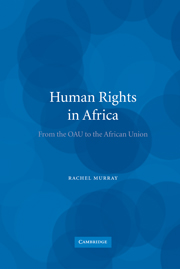Book contents
- Frontmatter
- Contents
- Acknowledgements
- List of abbreviations
- 1 Historical overview of human rights in the OAU/AU
- 2 The relationship between the OAU/AU and the African Commission on Human and Peoples' Rights
- 3 The link between human rights and democracy
- 4 The relationship between conflict and human rights
- 5 Women and the OAU/AU
- 6 Children's rights in the OAU/AU
- 7 Refugees and human rights
- 8 Development, NEPAD and human rights
- 9 Conclusion
- Appendix I Charter of the Organization of African Unity
- Appendix II Constitutive Act of the African Union
- Appendix III African Charter on Human and Peoples' Rights
- Bibliography
- Index
7 - Refugees and human rights
Published online by Cambridge University Press: 27 July 2009
- Frontmatter
- Contents
- Acknowledgements
- List of abbreviations
- 1 Historical overview of human rights in the OAU/AU
- 2 The relationship between the OAU/AU and the African Commission on Human and Peoples' Rights
- 3 The link between human rights and democracy
- 4 The relationship between conflict and human rights
- 5 Women and the OAU/AU
- 6 Children's rights in the OAU/AU
- 7 Refugees and human rights
- 8 Development, NEPAD and human rights
- 9 Conclusion
- Appendix I Charter of the Organization of African Unity
- Appendix II Constitutive Act of the African Union
- Appendix III African Charter on Human and Peoples' Rights
- Bibliography
- Index
Summary
The relationship between human rights and refugee law
Althoug human rights law generally applies to all individuals, regardless of nationality or citizenship, refugees have traditionally been dealt with via humanitarian law. Yet the continued separation of the two disciplines seems untenable: ‘It is no longer possible to interpret or apply the Refugee Convention without drawing on the text and jurisprudence of other human rights treaties. Conversely it is not possible to monitor the implementation of other human rights treaties, where refugees are concerned, without drawing on the text of the Refugee Convention and related interpretive conclusions of the UNHCR Executive Committee.’ In addition, there is an increased awareness that perhaps more permanent protection of refugees, returnees and internally displaced persons is needed, and this is accompanied by increasing reference to human rights standards.
However, even where human rights laws may provide protection, their applicability to refugees may not occur in practice as, it is argued, ‘a disproportionate amount of energy and resources tends to be focused on determining who is a refugee’. Further, ensuring that human rights standards are actually enforced for the benefit of refugees is problematic and in this regard the mechanisms available under the human rights treaties could be used. Unfortunately the success of the various international and regional human rights bodies in dealing with refugee issues has been limited, and their approach has been cautious.
- Type
- Chapter
- Information
- Human Rights in AfricaFrom the OAU to the African Union, pp. 185 - 234Publisher: Cambridge University PressPrint publication year: 2004



